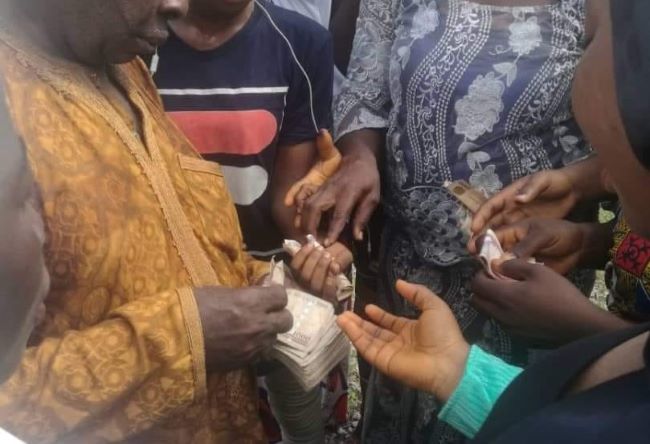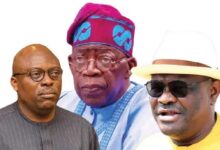Election Rigging: When Will Nigerians Say ‘Enough is Enough!’?

 By Nnanke Harry Willie
By Nnanke Harry Willie
25-year-old Nosa was full of high hopes in the build-up to the recent Edo state governorship election, he was very passionate about his candidate and worked hard to mobilise support in this direction. His best friend, Osa supported a different major candidate. Both were very sure that at the end of the day, the will of the people would prevail.
Expectations heightened with results coming up in real-time on the IREV (INEC Result Viewing (ReV) portal). The IReV which is linked to all BVASs at PUs to enable @inecnigeria officials does a real-time transmission of the uploaded results at your Polling Units on Election Day. Nosa and his friends however got a rude awakening when news filtered in that the process had been stopped and collation was to be concluded at the State Collation Centre. Afterwards, the transparency of the process was brought into question.
That singular act and the fallout therefrom is the basis of the criticism by a cross section of Election-Monitoring Groups and CSOs on the Edo Election. It is also the major complaint of opposition parties who believe that they have been dealt an unfair blow by the electoral umpire.
Nigeria Air: Scamming in Plane Sight – Nnanke H. Willie
While the opposition parties have threatened to head to the courts to seek redress, the voters who feel shortchanged have absolutely no avenue to seek redress over what they may consider a brazen theft of their ‘right to choose’. The feeling of impotence is excruciating!
Yiaga Africa says Edo Election failed integrity test, alleges results manipulation during collation
Sadly, Nigeria’s electoral landscape has been marred by systemic corruption, characterized by election rigging and ‘political terrorism’. This situation has reached a critical point, prompting a national discourse on the urgent need for reform. The various facets of this crisis reveal a troubling reality where democracy is undermined, and citizens are left disillusioned and flummoxed.
The Nigerian democratic process, once seen as a beacon of hope and a pathway to meaningful development, is now plagued by the corrosive practices of election rigging and political terrorism. The brazenness of electoral malpractice has reached an alarming peak, threatening not just the credibility of elections, but the future of the nation itself. When will Nigerians say, ‘Enough is Enough’?
This article seeks to look at the various anti-democratic actions and activities that many argue have derailed Nigeria’s democracy from ‘government for the people’ to ‘government for the powerful’.

- The Brazen Vote-Buying Epidemic
The sacred act of casting a vote, a fundamental pillar of democracy, has been reduced to a transactional exchange in Nigeria. During recent elections, vote buying has been carried out in broad daylight, as if it were a normal feature of the democratic process. Cash, food, and material gifts have been freely distributed to voters in exchange for their ballots, an act not just of corruption but of profound moral erosion. This brazen practice has flourished under the noses of both local and international observers, diminishing the integrity of elections and also diminishing the nation. Rather than being a contest of ideas or policies or even personalities, elections have turned into auctions where the highest bidder wins, to the detriment of genuine leadership.
How Mike Adenuga Jnr left the Lion’s Den to Become the Bull in Nigeria’s Economy
- Collation Rigging in the Recent Edo State Governorship Elections
The recent Edo State Governorship election is a prime example of how rigging continues to undermine the people’s will. Though there were reports of a relatively peaceful voting process, the integrity of the results came into question during the collation stage. At collation centers, votes were allegedly manipulated and falsified, with political agents influencing results to suit their candidate of choice. The real battle for the governorship did not happen at polling units but at the collation centers: behind closed doors, where transparency was sorely lacking.
According to an Election Monitoring Group and one of the accredited observers of Saturday’s off-cycle governorship election in Edo State, Yiaga Africa, the collation of results was greatly compromised and the poll failed the integrity test due to widespread manipulation of results.
The Election Monitoring Group therefore called for accountability and urgent amendment of the Electoral Act to make the electronic transmission of results mandatory.
- Local Government Elections ‘Magic’
Local government elections are as shambolic as they come. Typically, the ruling party in the state sweeps the chairmanship and councillorship positions clean. If you recall that local government elections are organized by the respective State Independent Electoral Commission, then you would understand why this charade has persisted over the years across party lines. Clearly, the various electoral commissions are anything but independent and the elections are simply selections by the state governors.
In the recent Imo State government elections, the Resident Electoral Commissioner did not even bother to read the results…he simply announced the winners. The temerity to assail and assault registered voters apparently knows no bounds!
- INEC’s Strategic ‘Technology Glitch’
One of the most glaring incidents of election rigging in recent times has been the so-called “technology glitch” orchestrated by the Independent National Electoral Commission (INEC). The introduction of electronic transmission of results was supposed to enhance transparency, yet the system mysteriously “malfunctioned” at critical moments, particularly when opposition candidates were leading in some areas. These glitches seem suspiciously convenient for the powers that be, raising serious questions about whether they were deliberately engineered to facilitate the manipulation of results.
During the 2023 elections, INEC actually claimed that there was a glitch on the IREV portal for the presidential election while in the same vein (on the same day and same time), the results for the Senatorial and House of Representatives Elections continued to flow in. You don’t need to be a tech guru to know what really happened!
- Alteration of Election Results at State Collation Centers
At various stages of collation, particularly at state levels, election results have been altered with reckless abandon. The manipulation of figures by INEC officials, in connivance with political actors, has become a well-worn tactic. The sanctity of the electoral process has been completely undermined, turning elections into a theatre of the absurd. What should be a simple arithmetic exercise of counting votes has instead become an avenue for corruption and primitive power consolidation.
- Electoral Officials and the Highest Bidders
The role of electoral officials in election rigging cannot be overemphasized. Rather than standing as neutral arbiters of the democratic process, many of them have become willing tools in the hands of politicians. With a compromised electoral umpire, the very foundation of democracy in Nigeria is on shaky ground. These officials, bought off by the highest bidders, manipulate figures, falsify reports, and destroy ballot papers, all in a bid to deliver victory to their paymasters and betray the voters.
25 Years of Unbroken Democracy… Whose Democracy?
- Massive Multiple Thumb-printing of Ballot Papers
Multiple thumb-printing of Ballot Papers used to be the norm. That however is no longer the rigging method of choice. Nonetheless, it still persists. In several instances, reports of massive multiple thumb-printing of ballot papers are carried out in collusion with electoral officials. These ballots, often pre-marked for a particular candidate, are smuggled into the electoral process by thugs and dishonest INEC officials. The result is a skewed election that fails to reflect the will of the people. This fraudulent practice renders the notion of “one man, one vote” an illusion.
- Collusion Between Politicians and Security Agents
The perceived collusion between security agents and politicians has become another dark feature of Nigeria’s elections. In many cases, security forces, who are supposed to protect the integrity of the process, have instead been used to intimidate voters, particularly in opposition strongholds. Their failure to act when thugs attack polling stations, steal ballot boxes, and harass voters speaks to a deep complicity in electoral fraud. Some of the security officers moan their helplessness as they tell the anguished electorate who approach them to reign in the thugs that they need orders from superior officers to act. As you can imagine, those orders rarely come.
- Collusion Between Politicians and the Judiciary
The judiciary, which should act as the last hope of the common man, is increasingly viewed as part of the problem. Pre-election judgements and Post-election tribunals, meant to address electoral grievances, are often seen as rigged in favour of the highest bidder or favoured candidates. With judges swayed by political pressure or financial inducements, the judiciary becomes complicit in legitimizing stolen mandates.
In a bizarre twist candidates whose names were never on the ballot have been named winners of elections. Also, a federal agency with issuing authority was forbidden from commenting on the status of a disputed certificate. Despite the agency insisting that it never issued the discharge certificate presented by the candidate, judges at several levels discountenanced its stance and cleared the candidate. Curiouser, curiouser!
Thess sordid acts discredit not only the legal system but the entire democratic process. It also dimishes the nation in the eyes of the world.
- Deployment of Thugs to Intimidate and Kill
The deployment of political thugs has become a common strategy for politicians who are unable to win fairly. In every election cycle, there are reports of hired thugs intimidating voters, destroying polling units, and in some cases, killing political opponents. These acts of political terrorism suppress voter turnout, particularly in opposition strongholds, thereby rigging the outcome in favor of the ruling party.
Consequences of Election Rigging
Election rigging is not a victimless crime. It has profound and far-reaching consequences for Nigeria’s development, social fabric, and future.
Stifling Growth and Development
The effects of election rigging on community growth and national development are devastating. When incompetent, corrupt, and visionless leaders are installed through rigged elections, they prioritize personal gain over public service. Public resources meant for roads, schools, healthcare, and infrastructure are diverted into private pockets, leaving communities in perpetual poverty. Development is stunted as leaders with no mandate or accountability to the people pursue selfish personal agendas and those of their sponsors.
Impact on Culture and Citizen Behavior
Election rigging also breeds a culture of cynicism and apathy among citizens. When people feel their votes don’t count, they lose faith in the democratic process and disengage from political participation. Over time, this erodes societal values, as the message sent to younger generations is that integrity, hard work, and fairness do not matter. Corruption becomes normalized, and citizens become passive participants in their oppression. This is already happening on an alarming scale.
Indeed, things are so bad that many Nigerians are now openly calling for military intervention. This can be avoided if the culture of criminal impunity by political gladiators is jettisoned for healthy political culture and respect for due process and the rule of law.

Installation of Misfits, Simpletons, and Criminals
Perhaps the most tragic consequence of election rigging is the installation of unqualified and corrupt individuals into high office. Instead of capable and visionary leaders, the country is often left with misfits and criminals who lack the competence and integrity to govern effectively. These leaders become more interested in maintaining power than in addressing the needs of the people, further deepening the country’s crises.
This has also led to the Nigeria’s political parties being notoriously devoid of ideology and principles. Even candidates refuse to articulate programmes that they can be held accountable to by citizens. No society can make progress without an envisioned future.
Election Rigging as a Destiny Thief
Election rigging is a thief of potential, a destroyer of destinies, both for individuals and for the nation. It robs communities of the opportunity to choose leaders who will champion their interests. It strips citizens of their right to participate in shaping their future. Worst of all, it keeps Nigeria in a perpetual state of underdevelopment, where opportunities for growth, innovation, and progress are stifled by inept, visionless and corrupt leadership.
Steps to Stop the Brazen Rigging of Elections
So, how do Nigerians fight back against this scourge?
- Demand Accountability: Citizens must demand accountability from electoral bodies, political parties, judiciary and security agencies. Independent, non-partisan electoral monitors/agencies and civil society groups must be empowered to hold these institutions accountable.
- Strengthen Electoral Reforms: Robust reforms are needed to close loopholes in the electoral process. This includes using secure electronic voting systems, ensuring real-time transparency in vote collation, and removing compromised officials from Electoral bodies. CSOs, influential citizens and progressive political parties and politicians must begin a massive push for the passing of electoral reforms that will guarantee free and fair elections. For starters, results collation must become automated on the IREV portal. Minimal human involvement should be guaranteed after voters have cast their votes.
- Unbundle INEC: INEC’s role should be limited to preparing and conducting elections. Another agency should be responsible for administering complaints arising from elections. This Agency, which must be dependent of government, should include, jurists, statisticians, tech experts and civil society advocates. A different Agency or department should identify culprits of election rigging and prosecute them with the full weight of the law. Presently, the electoral umpire, INEC, (and SIECs) is a law unto itself. This must stop!
- Engage in Voter Education: Citizens must be educated about the power of their vote and the dangers of selling it. Empowering people with knowledge and a sense of civic duty is key to reducing voter apathy and discouraging vote buying.
- Prosecute Electoral Offenders: Laws must be enforced. Perpetrators of electoral violence, rigging, and corruption must face swift and severe consequences to deter future acts of fraud. This should include staff of electoral bodies at all levels.
- Mass Civil Movements: Nigerians must embrace mass civil movements that advocate for electoral reforms, free and fair elections. Peaceful protests, social media campaigns, and grassroots mobilization can create pressure for change.
- Increased Vigilance: During elections, citizens should be encouraged to monitor the process, report fraud, and resist intimidation. The more people watch the process and insist on the right things being done, the harder it becomes for rigging to succeed.
Ultimate step
For the multitude of Nigerians, including Nosa and Osa who have become disenchanted with the scourge of rigging in Nigeria’s elections and indeed many other aspects of social endeavour, the options seem limited. Until Nigerians collectively decide to say “Enough is Enough” and take decisive action, the cycle of rigged elections will continue to rob the nation of its true potential. The future of Nigeria depends on the choices made today…choices that must reflect integrity, accountability, and the collective will to defend true democracy and the will of the people. A stolen election is a stolen future. It must not be allowed to stand. Enough of the rigging. Enough of the stealing. Nigeria must be great again!
Nnanke Harry Willie, the Audacious Brand Champion is an accomplished Brand & Media Consultant










